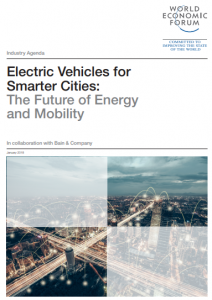Full Title: Electric Vehicles for Smarter Cities: The Future of Energy and Mobility
Author(s): World Economic Forum and Bain & Company
Publisher(s): World Economic Forum
Publication Date: January 1, 2018
Full Text: Download Resource
Description (excerpt):
Mobility is going to change rapidly in the coming years as electric vehicles (EV) proliferate, ride sharing continues to grow, and eventually autonomous vehicles (AV) enter urban fleets. This is especially true in cities where new forms of mobility are concentrated and where investment in supporting infrastructure is needed
to accommodate this growth. These changes coincide with the evolution towards cleaner, more decentralized and digitalized energy systems and services, and increasing electrification.
Today, public- and private-sector stakeholders deploy policy, infrastructure and business models based largely
on current patterns of mobility and vehicle ownership. The uptake of privately owned EVs is encouraged, while business models for charging stations vary, as they are deployed or operated by a range of players – public agencies, car manufacturers, energy companies and pure players. Limited interoperability and digitalization of infrastructure can make broad customer engagement challenging. Outside the energy sector, awareness of energy-related issues is low. Mobility integration with electricity system and grid edge technologies is emerging. As a consequence, EV charging could create local constraints and stability problems on power networks
and reduce the environmental benefits of electrification.
